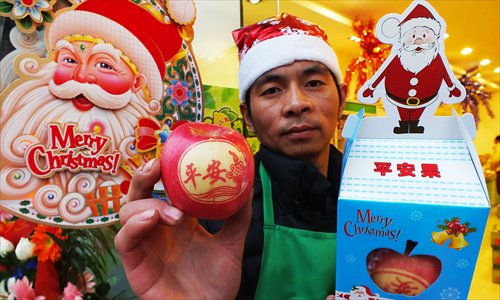Peace of apple

A vendor displays a Christmas apple imprinted with an auspicious message. Photo: IC
Little by little, Christmas is developing Chinese characteristics. Young people celebrate Christmas Eve nowadays by staying out all night with friends - and churches have become a popular destination, though more for the atmosphere of candlelight and choirs than for any religious significance. And then there's the increasingly widespread gift tradition of Christmas apples, or ping'anguo.
According to folklorist Ai Jun, the Christmas apple is a 100 percent Chinese phenomenon, inspired by the similarity of the words for Christmas Eve, which translates as "peaceful night" (ping'an ye), and for apples (pingguo).
On e-commerce site taobao.com, a search for ping'anguo brings up 23,600 results. The most popular item is a boxed apple that sells for 68 yuan ($11); 2,492 were sold last month, but orders have tripled since December 22.
So what turns an ordinary apple into a Christmas ping'anguo? The packaging, mostly. Some apples are wrapped in bright cellophane and ribbons, others are sold in heart-shaped boxes, and still others are tucked into tins with chocolates and flowers.
"Most buyers are young men buying apples for their girlfriends," said the owner of a Taobao store called Shengsen Fruit, adding that most greeting cards sent on the buyers' behalf feature romantic messages.
Some apples speak for themselves, with auspicious words "imprinted" on their skin. "When the apples are about to ripen, farmers apply a stencil sticker to the fruit," said the Shengsen Fruit vendor. "Any part of the peel covered by the sticker turns lighter in color, and thus the words are printed on the apple."
As Christmas Eve approaches, last-minute shoppers can buy from enterprising apple-sellers on the street. Pan, a girl who works in a bank, recently bought 100 apples and 200 cellophane wrappers, and has been spending her evenings selling ping'anguo outside the Capital University of Economics.
"I sell them for six yuan each, nearly the same price as when I was in university two years ago," smiled Pan. "Actually, I don't know whether the ping'anguo tradition is Western or Chinese. I'm just doing this for good luck - and for the cash."
There may even be a new fruit joining in on the Christmas fun. "This year, we started to sell gift boxes containing an orange and an apple," said the Taobao vendor. In Chinese, the word for orange (cheng) is a homophone for earnestness and honesty. "The orange symbolizes sincerity, and the gift box is a wish for true love."
According to Shi Aidong, a folklorist at the Chinese Academy of Social Sciences, fruits and plants have been used to symbolize auspiciousness since ancient times. For example, when a couple gets married, dates (zao) and peanuts (huasheng) express the wish, "May you soon have a precious son" (zaosheng guizi).
Some young people have made a ritual of buying a Christmas apple using 24 ten-cent coins, each given by a different friend. Ten cents (shifen) sounds like the Chinese word for "perfect" and 24 is the date that Christmas Eve falls on.
"When a behavior becomes a habit for most people, it can quickly become a custom," said Ai. "Young people in Chinese are creative and imaginative enough to create a brand-new Christmas culture. It's just for fun - it's not religious."
Not everyone is a fan of the new tradition. According to Tian Zhaoyuan, head of the Folklore Department of East China Normal University, the custom is more commercial than cultural. "It seems like a business plan to sell apples and oranges, which lacks a deep cultural foundation."